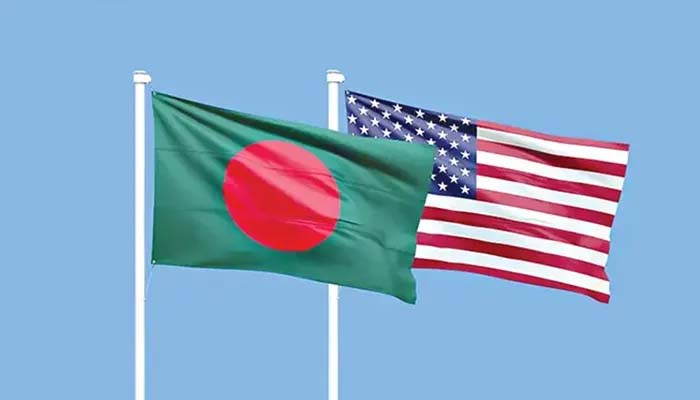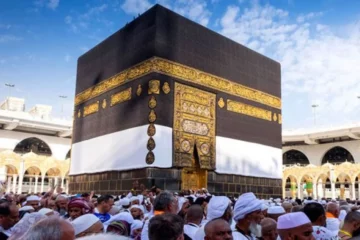The US wants to know what role the government will play in security and how it plans to provide security during free and fair elections. At this time, they also want to know the role of the government in upholding human rights. These issues came up in Dhaka-Washington Ninth Security Dialogue.
The dialogue was held at Foreign Service Academy in the capital on Tuesday morning. Deputy Assistant Secretary for Regional Security for Political Military Affairs of the US Department of State, who is visiting Dhaka, Meera Kay Resnick, led the US delegation in the dialogue. Khandaker Masudul Alam, Director General of the North American Division of the Ministry of Foreign Affairs, led the Bangladesh side. Mira K. Resnick paid a courtesy call on Foreign Secretary Masood Bin Momen at the Foreign Service Academy after the dialogue.
According to a source, the United States wants to see free and fair elections in Bangladesh. There should be no violence at this time. Therefore, it is requested to know what plan the government has taken to make the elections fair. At the same time, during the elections, Washington gave an opinion in favor of keeping the human rights situation of Bangladesh at international standards.
A diplomat who participated in the dialogue told Samakal on condition of anonymity that the Bangladesh delegation has highlighted the government's commitment to make the upcoming parliamentary elections free and fair. However, there is no clear idea on how to do that.
After the dialogue, the Foreign Secretary told reporters, 'Bangladesh is fulfilling its obligations regarding human rights. The point is reiterated in the dialogue. They want to know about the election. Bangladesh is determined to hold free and fair elections. The Prime Minister has said this many times. He also told foreigners. The Election Commission (EC) is working on it. Recently EC started training program. If help is needed there, the United States wants to do it. But we cannot say what the political party is thinking.' However, the foreign secretary said that there was no discussion about the government during the election.
Foreign Secretary Masoud bin Momen said that the talks were fruitful and the US delegation expressed its satisfaction. "Apart from defence, human rights, upcoming national elections, cyber security, Indo-Pacific outlook and energy security were also discussed," he said.
He said, 'There was no direct discussion on the defense treaty, as it was the subject of the defense dialogue. However, we have said that Bangladesh is working on similar agreements with different countries. We are gathering experience in this regard from different countries.
Regarding the lifting of the ban on Rabe, he said, 'The United States has discussed the lifting of the ban on Rabe. We have stated that we take every complaint about human rights violations seriously. We discuss them with law enforcement agencies and disseminate their answers to the outside world. We do not allow any chance of injustice in our country. RAB-Police each has a code of conduct. Even if you spend a bullet, you have to be accountable. Not all complaints or accidents involve the government. For example, a labor leader died in Gazipur. The government has no hand there. In the end we have to answer.' He said that the process to withdraw the ban on Raber is being followed.
When asked about the United States' comments on Bangladesh's Indo-Pacific outlook, the foreign secretary said, 'United States and Bangladesh have a lot in common in the Indo-Pacific. The two countries agree on the free movement of ships there, the full use of economic potential. They also don't want any particular country to dominate or become a barrier to free movement.' The foreign secretary did not give any answer when asked if the United States talked about China as a single hegemony.
Masud bin Momen said, 'They are currently banned from going out, let their assistance with other forces and organizations including our police-army continue. Army to Army joint exercises are there, they will continue and will be intensified in the future.'
In the dialogue, updated information on the Rohingya issue was presented to the US. The foreign secretary said, 'We have said that we want a solution to this crisis. Talking about humanitarian aid, we also stated our position on how to repatriate the 1.1 million Rohingya. However, the US has raised questions about security in Rakhine at the moment. They have some observations. There is no different attitude, the United States has advised the Rohingyas to take initiative in repatriation if their safety and security is ensured and they want to go voluntarily.
Prime Minister's visit to India
The Foreign Secretary said that Prime Minister Sheikh Hasina will meet Prime Minister Narendra Modi during her visit to India. The meeting will be held on the evening of September 8. Important issues including Teesta will be discussed in the meeting.
Masood bin Momen said, 'There are many bilateral issues. All will be discussed. Connectivity and Teesta water will be discussed. Energy and food security will also be discussed. All important issues will be discussed. There are many projects between the two countries, the progress of which will be discussed.
Visit of the Russian Foreign Minister
Foreign Secretary Masud bin Momen said that with Russian Foreign Minister Sergey Lavrov, Foreign Minister Dr. AK Abdul Momen will have a bilateral meeting. He will have a courtesy meeting with the Prime Minister. After the Russia-Ukraine war, the critical situation in the world will be discussed. Food security, sanctions, counter-sanctions will also be discussed.






